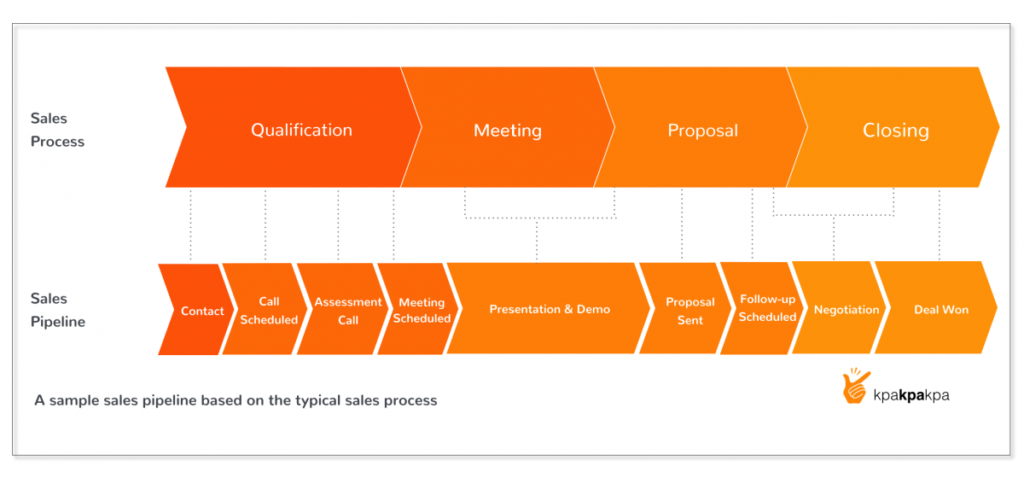The most important metrics for a growing business in Nigeria is increasing revenue. Gaining new customers, acquiring new users, and growing your team, are important metrics but it should all be tied to this important growth metric of hitting and exceeding your sales goals.
So how does a new or growing company develop a successful strategy to hit its sales goals in Nigeria?
Here are a few steps that will help you and your team set measurable goals while setting an effective framework to continuously keep you accountable as you work towards your yearly targets.
Start with SMART sales goals
Start by defining SMART goals. This is a framework that is widely used by organizations to set goals that are easy to track and hit.
The SMART goals methodology is:
Specific
Measurable
Achievable
Realistic
Time-based
Use these factors as a checklist to validate your planned sales goals and targets in Nigeria. Ultimately you want these goals to motivate your sales team to exceed expectations and drive your business growth.
Here are some factors that will give you the clarity you need to set SMART sales goals for your business in Nigeria
Be clear on your addressable market
Setting audacious sales goals in Nigeria can be good for your business but it could also be very deflating for your sales team when they do not hit those goals.
Start by clearly assessing the market that you are in. Understand the size of the addressable market, the current competitors, and the purchasing power of your target base, and most importantly the need that your product is filling.
Answers to these questions, through the appropriate due diligence process, will allow you to develop realistic goals for your team.
Be realistic about your available resources
To set sales goals that are actually achievable, you have to be very honest about the resources that you have available. Start by evaluating your current sales team.
What can you do with the resources you have right now?
If your sales goals can’t be hit by the team you have now, it doesn’t matter how much work you put in. You have to scale your goals according to the dedicated resources that you have available to hunt down new business.
If you do have the financial resources, you can hire new sales agents to supplement the team that’d help you meet your targets.
Educate and Empower Your Team
Sales can be a hard-fought battle sometimes and you want your team to have the best gear, weapons, and tools available to them – ready for battle. Don’t let revenue monopolize your focus.
Think about the best ways to empower your team and inspires them to drive your business growth. This means providing sufficient training and resources around your company’s unique product, but also the framework and tools to see if what they’re doing is actually working.
Get clarity on value proposition and target audience
Before you send your team out into the field, it is important that they are clear on targeting your ideal prospects.
Spend time educating your team on the unique value proposition that your localized solutions bring to the market and the profile of customers that need your product. This knowledge will empower your team to spend their time more efficiently, increasing your ROI on your sales efforts.
Design Your Sales Pipeline
Breaking down the entire sales process in actionable chunks is a structure that will provide your team with the appropriate guidance as they work on achieving their individual sales goals.
Developing a sales pipeline for each product with your team will give you visibility into the bottlenecks in your sales process and the best places to optimize.

Understand the complete sales cycle
Another important insight that you can help your team hit its sales goals is a clear understanding of the typical sales cycle.
By understanding the sales cycle length, you empower your team with the knowledge of how long it takes to close a deal – from initial conversation to a signed agreement.
It is important to know this so that your team can be proactive. For instance, if it usually takes 8 months from initial contact to “deal closed”, then your team has to build out its pipeline to make sure there are enough prospects in the pipeline to manage the long lead time.
Another factor to keep in mind is the seasonalities and fluctuation of the sales cycle that comes with your business. For instance, in certain industries, sales drop during the summer season – when a lot of decision-makers take holidays.
Being aware of this sort of drop in correspondence during the sales cycle will help you and your team plan around that dip.
Monitor Your Team’s Sales Goals Progress
Empowering your team with the right tools will help get them prepared to hit their sales goals.
But goals are of no use if they’re not being monitored. Track progress through a dashboard in your CRM, or have your sales reps enter their weekly numbers the old-fashioned way, in an Excel spreadsheet.
To set up your sales goals to be properly monitored, follow these short steps:
Set activity goals
Break down each sales rep’s goal into measurable ‘activity-based’ goals. Use historical data in your sales funnel to figure out how many emails, calls, and meetings they need to hit their sales goals.
Let’s say they have to close an average of two deals per month to hit quota. If 25% of their initial meetings convert to a deal, that means they must have at least eight initial meetings each month. If 20% of their emails or calls lead to initial meetings, they need to call or email roughly 40 people.
Working backward lets you turn an intimidating revenue goal into manageable metrics.
Measure progress monthly
Make sure you are tracking your team’s activities on a weekly and monthly basis.
If someone on your team isn’t hitting their weekly or monthly numbers, make sure you talk to them and figure out how to rectify any hold-ups before it becomes an impediment to meeting their yearly quota. Monitoring these small goals in smaller chunks of time makes it easier to track your sales goals over the year.
And if you’re putting in the numbers on each activity and your sales goals still aren’t being hit?
Here are a few ideas to get your sales goals back on track:
You need to contact more people in the front-end of your pipeline. Work with your marketing team or look for ways to find more prospects and generate more leads.
There’s a significant drop-off from the number of leads contacted and the number of initial meetings. You may not be identifying the best leads. Is there more you can do to qualify the leads you’re contacting to make sure they fit your ideal target base?
Your conversion rate is too low. Dig back into your process and start to experiment where people are dropping off.
You’re not getting enough prospects to the negotiation stage. You may not be selling your product effectively. Work with your team to understand the benefits of your product more so they can better respond to common objections during the presentation stage.
Make changes to the solution itself. Be attentive to the feedback that you are getting. Find out which of their needs isn’t being fulfilled and communicate those needs to your development team.
Prioritize goals
Once you have set activity goals for your team and you are continuously monitoring, you can boost the returns on your team’s efforts by helping them prioritize their goals.
Determine which goals bring the highest value when hit, and make sure your reps are meeting those goals first. This should include tasks that matter most to your rep’s professional goals and your company’s profitability.
Keep Your Team Motivated
Keeping your team motivated to hit your yearly sales goals will be one of your main tasks as a business owner or sales manager. Determine the compensation package or the incentive structure that works for your team members.
Sales bonus: Include a compensation reward or bonus for hitting monthly and yearly sales goals.
Stretch goal reward: Although this is not for everyone, you can set realistic stretch goals for your high-performing reps – perhaps 125% of their goal – that will challenge and motivate them. Provide a reward for hitting the stretch goals.
Retention-based incentives: To incentivize your sales reps to sign up repeat customers that will bring a longer lifetime value to your business, create a reward that compensates your rep every time a deal they close is renewed. This will incentivize them to also think long-term for your business.
Besides monetary compensation, there are other rewards such as extra vacation time, recognition, and awards that can keep your team motivated to hit their goals. Find a reward system that works best for your organization and continue to improve your incentive package to attract the best talent.
Learn, Adjust, and Repeat
Depending on the stage that your business is in, you might just be setting up your sales process for the first time or improving the process from previous years, you want to continue to optimize your entire sales to consistently hit or exceed your sales goals.
If you are just starting out, don’t expect to get your sales goals right from the first try. Use the tips above to determine a good starting point and iterate your process based on the performance and feedback that you get from your first attempt.
Begin with concrete measurable goals, empower your team with the right tools, monitor your sales goals progress, and find the best way to keep you and your team motivated on your path to business success in the Nigerian market.

